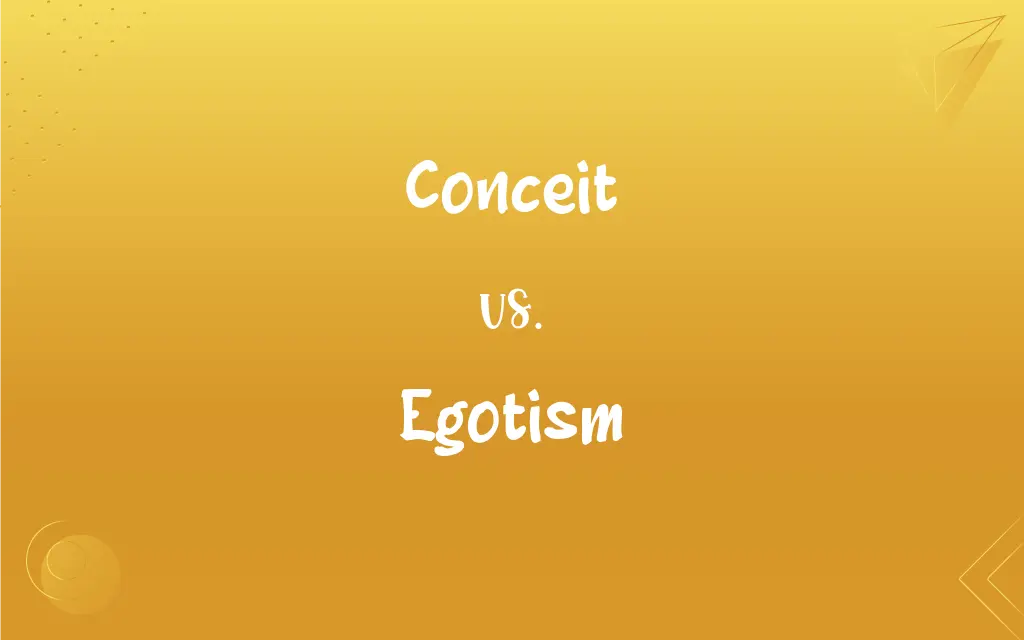Conceit vs. Egotism: What's the Difference?
Edited by Aimie Carlson || By Janet White || Published on March 5, 2024
Conceit is excessive pride in oneself or one's achievements, often with a lack of awareness, while egotism is an obsessive focus on oneself, with disregard for others.

Key Differences
Conceit often manifests as an inflated sense of self-worth or abilities, potentially leading to arrogance or vanity. Egotism, by contrast, encompasses a broader range of self-centered behavior, including selfishness and disregard for others. While conceit focuses on one's elevated perception of oneself, egotism emphasizes the overarching self-absorption that can affect interpersonal relationships.
Individuals with conceit may not recognize their exaggerated self-view, which can lead to conflicts or alienation in social and professional settings. Egotism, characterized by excessive self-interest, often results in a lack of empathy and consideration, making meaningful connections with others challenging. Both traits can hinder personal and professional relationships, but egotism's broader implications on one's interaction with the world can be more detrimental.
Conceit can be perceived as off-putting or unattractive because it suggests a lack of humility or self-awareness. In contrast, egotism might be seen as more blatantly offensive, as it encompasses a wider range of self-centered actions and attitudes that disregard others' feelings or needs. Society may forgive conceited behavior if it's accompanied by genuine talent or achievement, but egotistic behavior is less likely to be excused.
Conceit may stem from insecurity or a defensive mechanism to mask perceived inadequacies. Egotism, however, often arises from a deeper psychological need for affirmation and dominance over others, reflecting a more entrenched self-focus. Understanding the psychological underpinnings of both can be crucial for addressing and mitigating their impacts.
Individuals exhibiting conceit might adjust their behavior with increased self-awareness or feedback from others. Those with egotistic tendencies may find change more challenging, as egotism involves more fundamental aspects of personality and worldview. Personal growth and improved relationships require acknowledging and working on both conceited and egotistic behaviors, albeit with different strategies.
ADVERTISEMENT
Comparison Chart
Definition
Excessive pride in oneself
Obsessive self-focus
Manifestation
Often shown as vanity or arrogance
Displayed as self-absorption
Impact on Relationships
Can alienate others inadvertently
Often leads to disregard for others
Social Perception
Seen as off-putting but can be overlooked if talented
Broadly offensive due to lack of empathy
Psychological Roots
May stem from insecurity
Rooted in a need for affirmation
ADVERTISEMENT
Conceit and Egotism Definitions
Conceit
An overly favorable opinion of one's own ability.
Her conceit in her singing talent led her to ignore constructive criticism.
Egotism
Excessive reference to oneself in conversation or writing.
His egotism was apparent in every story he told, always making himself the hero.
Conceit
Vanity or self-admiration.
The actor's conceit was clear in his refusal to acknowledge his co-stars.
Egotism
An inflated sense of self-importance.
Her egotism was evident in her belief that the rules didn't apply to her.
Conceit
Excessive pride in one's achievements.
His conceit was evident when he claimed all the credit for the project's success.
Egotism
The habit of valuing everything only in reference to one's personal interest.
Her egotism made her incapable of empathizing with her friends' struggles.
Conceit
The quality of being arrogantly proud.
His conceit prevented him from asking for much-needed help.
Egotism
Self-centeredness or selfishness.
His egotism left little room for consideration of his team's ideas.
Conceit
A fanciful expression in writing or speech; an elaborate metaphor.
The poem's conceit cleverly compared love to a journey.
Egotism
An inflated sense of one's own importance; conceit.
Conceit
Unduly favorable estimation of one's own abilities or worth; overly positive self-regard.
Egotism
A tendency to talk excessively about oneself.
Conceit
(Archaic) Estimation or opinion of something, especially when favorable.
Egotism
A belief that one is superior to or more important than others.
Egotism
(countable) The result or product of being egoistic.
Egotism
Egoism belief that behavior should be directed towards one's self-interest.
Egotism
The practice of too frequently using the word I; hence, a speaking or writing overmuch of one's self; self-exaltation; self-praise; the act or practice of magnifying one's self or parading one's own doings. The word is also used in the sense of egoism.
His excessive egotism, which filled all objects with himself.
Egotism
An exaggerated opinion of your own importance
Egotism
An inflated feeling of pride in your superiority to others
Egotism
Obsession with oneself to the detriment of relationships with others.
His egotism strained many friendships, as he rarely showed interest in others' lives.
FAQs
What is conceit?
Excessive pride or self-admiration, often without basis in reality.
Can egotism be corrected or improved?
With self-awareness and effort, individuals can learn to focus more on others and less on themselves.
What causes conceit?
Often, it stems from insecurity or a need to mask perceived deficiencies.
How does egotism differ from conceit?
Egotism is broader, encompassing an obsessive self-focus, while conceit specifically refers to an inflated self-view.
Can conceit be positive?
While conceit is generally negative, confidence or pride in one's abilities isn't inherently bad unless it becomes excessive.
How do conceit and egotism affect workplace dynamics?
They can lead to conflicts, reduced collaboration, and a toxic environment.
Why is egotism viewed negatively?
It often leads to behavior that disregards or devalues others, affecting relationships and social harmony.
How can one recognize conceited behavior in themselves?
By noticing a consistent overvaluation of one's achievements or abilities, especially in comparison to others.
Do conceit and egotism have psychological treatments?
Counseling or therapy can help address underlying causes and promote healthier self-perception and behaviors.
What are the effects of egotism on personal relationships?
It can lead to conflicts, misunderstandings, and a lack of deep, meaningful connections.
Are conceit and egotism exclusive to certain age groups or cultures?
No, they can be found across all ages and cultures, though expressions may vary.
How do conceit and egotism impact leadership?
They can undermine a leader's effectiveness by prioritizing self over team or organizational goals.
Can egotism be mistaken for ambition?
Sometimes, but ambition typically involves goals beyond self-aggrandizement.
How do conceit and egotism relate to empathy?
Both traits often involve a lack of empathy, focusing on self to the exclusion of others' feelings or needs.
Is conceit the same as confidence?
No, conceit crosses into overconfidence and lacks the grounding in reality that healthy confidence has.
Can a person be both conceited and egotistic?
Yes, as these traits can overlap, especially in extreme self-focus or self-admiration.
Is there a healthy level of self-focus?
Yes, self-care and self-awareness are important, as long as they don't diminish care for others.
What is the first step in overcoming egotism?
Recognizing one's behavior and its impacts on others is crucial.
How does society typically respond to egotistic behavior?
Negatively, as it goes against communal values of empathy and cooperation.
Can literature or art be conceited?
Yes, if they overly focus on the creator's cleverness or importance.
About Author
Written by
Janet WhiteJanet White has been an esteemed writer and blogger for Difference Wiki. Holding a Master's degree in Science and Medical Journalism from the prestigious Boston University, she has consistently demonstrated her expertise and passion for her field. When she's not immersed in her work, Janet relishes her time exercising, delving into a good book, and cherishing moments with friends and family.
Edited by
Aimie CarlsonAimie Carlson, holding a master's degree in English literature, is a fervent English language enthusiast. She lends her writing talents to Difference Wiki, a prominent website that specializes in comparisons, offering readers insightful analyses that both captivate and inform.































































